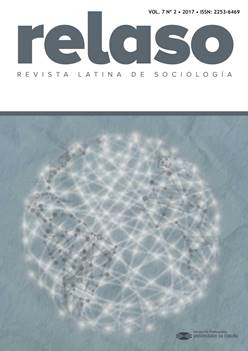Balbinos y Manolitos: Investigación sobre “diglosia convivencial” villa-aldea (del prestigio y privilegio de unos sobre otros)
Contenido principal del artículo
Resumen
La transformación comportamental de cada ser humano ante otro con más poder se ve reflejada asimétricamente en el “trato”. El proceso por el cual acabamos dominando o dominados es lo que nos ocupa en este estudio, pues existen tantas formas de ejercer el poder como de tratar y tantas de resistirlo, combatirlo, asimilarlo, acatarlo…como fisuras o no tenga la cadencia de su discurso y práctica. Analizaremos una realidad de poder asimétrico que se da en Galicia (España). La etnografía nos ha facilitado, mediante el contacto directo con las personas durante dos años, un conocimiento que las entrevistas dirigidas y la observación participante clarifican. Si, como proponemos, los problemas de discriminación grupales buscan un orden social que beneficie a un grupo sobre otro, éste no es posible sin el sustento ideológico que haga merecedor de privilegios a uno de los grupos. Para investigar la etnografía nos ha resultado la metodología más adecuada, puesto que su objetivo es analizar las creencias y valores que orientan la conducta de las personas como seres sociales. Hemos llamado “diglosia convivencial” a la realidad vista y que definimos para que nos sirva de taladro argumental. La diglosia está explicada desde la lingüística y se refiere a cuando dos lenguas conviven en un mismo territorio pero sólo una de ellas detenta el poder político y social. Cuando hablamos de diglosia convivencial lo hacemos de las prácticas sucesivas de dominio y resistencia/asimilación a lo largo de un tiempo. El resultado de la convivencia dentro de un poder asimétrico, en diglosia convivencial, es un perfil identitario empoderado o autodespreciado que define a los humanos del territorio. Las consecuencias son observables tras un análisis detenido, pero el proceso que las ha conquistado resulta de gran interés, porque tal vez pueda dar luz sobre el cómo revertir un proceso de maltrato: la interculturalidad como utopía. Entendemos la utopía como un paso adelante en la relación, en el trato, ir más allá en la relación simétrica, disfrutar de la misma y construir nuevos espacios entretejidos.
Palabras clave:
Descargas
Métricas
Detalles del artículo
Citas
Álvarez, J. M. D. (2006). Fundamentación de la moral y diferencias normativo-culturales: una aproximación fenomenológica. Anuari de la Societat Catalana de Filosofia, 153-167.
De Rota, J. A. F. (2000). Del objeto etnográfico como vida a la vida como espectáculo. In Anales de la Fundación Joaquín Costa (No. 17, pp. 205-216).
De Rota, J. A. F. (1992). La antropología gallega a debate. In Anales de la Fundación Joaquín Costa (No. 9, pp. 123-146).
Díaz Álvarez, J. M. (2004). Fundamentación de la moral y diferencias normativo-culturales: una aproximación fenomenológica. Anuari de la Societat Catalana de Filosofia, (17).
Dietz, G. (2013). Comunidad e interculturalidad entre lo propio y lo ajeno. Hacia una gramática de la diversidad. Baronnet, B. & Tapia, U.(coords.). Educación e interculturalidad: política y políticas, 177-199.153-167.
Galanes, Y. (2017). Memorias dun neno labrego: revisitando la literatura de la emigración a través de la traducción. transfer, 12(1-2).
Galeano, E. (2000). El libro de los abrazos. Madrid. Siglo XXI.
Gramsci, A. (1978). El concepto de hegemonía en Gramsci. México: Ediciones de Cultura Popular.
Gutiérrez, O. E. V., & López, L. I. L. (2017). El lenguaje, umbral de integración en la docencia (Ensayo crítico)/Language, the threshold of integration in teaching (Critical essay). Diálogos sobre educación, (14).
De Sousa Santos, B. (2009) Una epistemología del sur: la reinvención del conocimiento y la emancipación social. DF. CLACSO. Siglo XXI.
De Sousa Santos, B. (2009). Más allá del pensamiento abismal: de las líneas globales a una ecología de saberes. 2009, 31.
De Sousa Santos, B. (2011). Epistemologías del sur. Utopía y praxis latinoamericana, 16(54).
Del Olmo, M. 2010. “Introducción”. En Dilemas éticos en antropología. Las entretelas del trabajo de campo etnográfico, editado por Margarita del Olmo. Madrid: Trotta. Pgs. 9-11.
Méndez, P., & Lucas, R. (2014). Metáforas y articulaciones para una pedagogía crítica sobre la interseccionalidad. Quaderns de Psicologia, 16(1), 0055-72.
Minda, P. (2017) Medicina Tradicional Esmeraldeña como Patrimonio Cultural Inmaterial. Quito. Editorial Abya-Yala
Miranda, M. D. C. S., Rui, M., & Kazantzakis, N. Contrastes culturales entre lo urbano y lo rural. Continuando una vieja amistad… Universidad y Cine, 11.
Monge Martínez, F. (2003). Encuentros (polémicos) en el Pacífico entre viajeros ilustrados y nativos.
Pardo, J. C. S. (2007). Una propuesta de análisis geohistórico de las aldeas tradicionales gallegas. Cuadernos de Estudios Gallegos, 54(120), 103-134.
Piñeiro, E. (2009) Lo Olvidado, lo Aprendido, lo Integrado. Sobre saberes Migrantes. Revista de Antropología Experimental Nº 9, 2009. Texto 11. Pgs. 153-167.
Piñeiro, E. (2015) Observación Participante. Una Introducción. Número Especial 1 Revista San Gregorio. Metodología de la Investigación. 2015. Pgs. 80-89.
Rivas, M. (2012). Una espía en el reino de Galicia. Aguilar.
Saco, A. (2010). Desarrollo rural despoblación en Galicia: escenarios y desarrollos de futuro. Ager. Revista de estudios sobre despoblación y desarrollo rural, (9).
Urteaga, E. (2016). Blanchet, Philippe (2016): Discriminations: combattre la glottophobie. Paris: Textuel. 192 páginas.
Veronelli, G. A. (2016). About the coloniality of language. Universitas Humanística, (81), 33-58.
Viana, L. D. G. (2003). La aldea fantasma: problemas en el estudio del folklore y la cultura popular contemporáneos. Revista de dialectología y tradiciones populares, 58(1), 29-46.
Vilas, X. S. N. (2012). Memorias dun neno labrego (Vol. 1). Editorial Galaxia.


